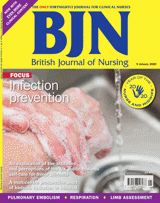I have a confession—I am in favour of the nursing associate role. I can say this with some knowledge and experience, having been fully immersed in the development of the role as part of a first-wave test site, supporting our ‘legacy’ cohort to graduation and Nursing and Midwifery Council registration in January 2019. I recognise the experience of those involved in the first cohort was special—coping with a new role, a new curriculum, a regulator, in-year changes and press attention. These were motivated and experienced healthcare staff who were suddenly both in the spotlight and being valued in a different way—heady stuff!
However, it is not just this experience that has influenced my support for this role. Learning from the past, alongside all of the emerging evidence of future nursing, population health and care needs, show that a rethinking of the workforce is required.
The advent of the nursing associate role is set in a post-Francis report landscape and we should not lose sight of lessons of that public inquiry (Francis, 2013).
The nursing associate is a new role, born out of a number of key reviews and major policy changes that include the Five Year Forward View (NHS England, 2014), Leading Change, Adding Value (NHS England, 2016) and Seven-day Services in the NHS (NHS Improvement, 2016). It involves changes to both the mix of teams delivering care and to the roles and responsibilities of members of those teams.
A significant recommendation in the Shape of Caring review (Willis, 2015) was the creation of a nursing associate role—expected to work alongside care assistants and registered nurses (RNs) to deliver hands-on care, focusing on ensuring people continue to get the quality, person-centred care they deserve.
The NHS Long Term Plan (NHS England and NHS Improvement, 2019) describes an ambition to develop a service fit for the future, and many of the ‘deliverables’ in the plan depend upon high-quality, effective nursing care. Alongside this, is the demand on the social care sector from an ageing population.
RNs represent 48.8% (41 000) of the regulated professions in adult social care (Skills for Care, 2019). In order to maintain registration as a care home with nursing, employers will need to ensure they meet regulation 18—having ‘sufficient numbers of suitably qualified, competent, skilled and experienced persons’ (Care Quality Commission, 2019). There is anecdotal evidence of an increasing number of nursing homes either closing or re-registering as residential homes due to the lack of nursing cover.
I believe employers, across both sectors, should increase significantly the numbers of nursing associates and support the development of this role. This will not endanger the role of the RN, rather it supports the further development of the RN.
The nursing associate role has been compared with that of the enrolled nurse. I have a second confession—I qualified as an enrolled nurse in 1984. We were seen as ‘practical nurses’ supporting first-level registered colleagues. That is where the similarities cease. I was fortunate to work in an authority that deployed enrolled nurses successfully. I also now recognise that I chose roles that gave me challenges and responsibility. Not all authorities utilised the enrolled nurse in this way. And there was little opportunity to progress—my self-funded conversion to RN in 1993 opened doors that had been firmly closed in the past. Unlike enrolled nurses, nursing associates are educated to level 5, foundation degree level, with a person-centred, holistic curriculum, crossing traditional fields of nursing and demanding high levels of knowledge and critical thinking.
What an opportunity we have—to look at the predicted needs of the population and think about who is best placed to deliver the nursing care required. For me, the nursing associate role is fundamental to the future delivery of nursing care, where the RN retains directional control of the care being provided and is able to lead, develop and work consistently at the upper levels of registration.
This new role has the potential to transform the nursing and social care workforce.

